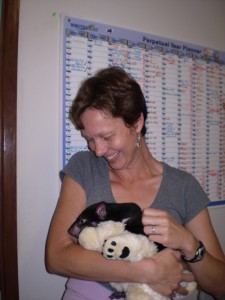Devil Vaccine on Horizon
RESEARCHERS at the Deakin University in Victoria have found what they believe may be the magic bullet in the race to save the Tasmanian devil species from cancer, but say conservation programs like the Devil’s Ark are still critical.
The immunity of devils without the cancer was compared to the immunity of devils with the cancer and an antibody was identified.
Dr Beata Ujvari, who worked on the study said the devils with the higher ratio of the natural antibodies were less likely to have the cancer.
“We can deduce then that devils with higher natural antibody ratio are therefore less susceptible to the contagious cancer,” said Dr Ujvari.
“Anti-tumour vaccines that enhance the production of these natural antibodies, or direct treatment of the cancer with natural antibodies, could become a solution to help halt this disease,” she said.
“This process known as ‘active immunotherapy’, is becoming more and more accepted in treating human cancers, and we think it could be the magic bullet in saving the Tasmanian devils from extinction,” Beata Ujvari said.
However, the vaccine may take years to develop and in the meantime Dr Ujvari said the conservation work of the Devil’s Ark remained critical to the species.
“This is the first stage towards developing the vaccine and it may take several years to develop, so it is very important that existing conversation programs like the Devils Ark continue,” said Dr Ujvari.
“Ongoing conservation programs, such as the insurance population, are essential part of the steps being taken to save the Tasmanian devils from extinction,” she said.
“The creation and maintenance of a genetically diverse captive population of devils where the behavioural integrity of the species is also maintained makes a significant contribution to the survival of the devils, the largest extant marsupial carnivores,” Beara Ujvari said.
Read the full research paper: Nature Scientific Reports.
 scone.com.au
scone.com.au